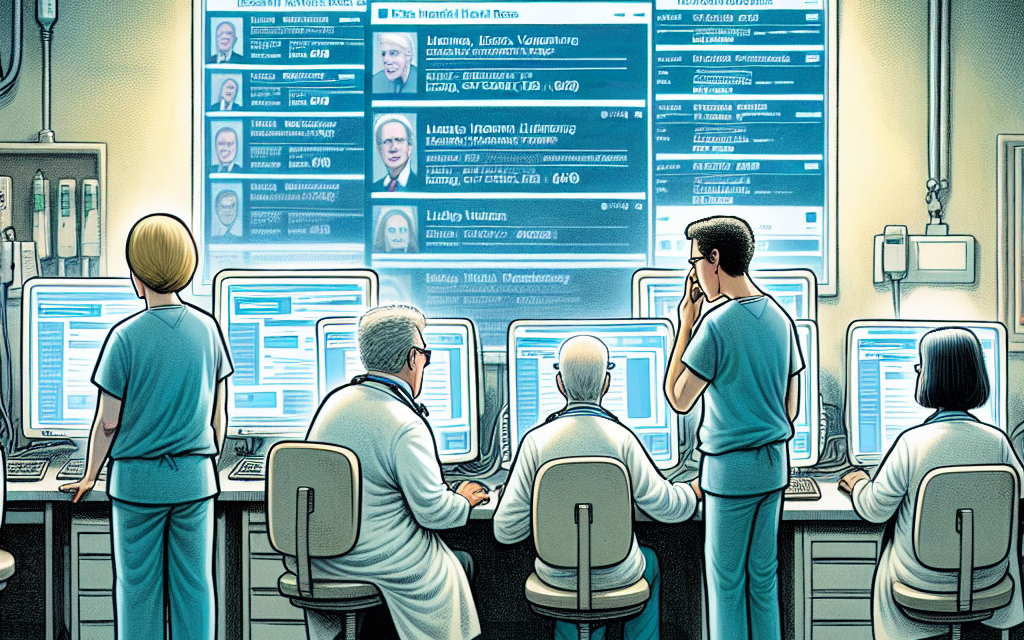Potential Unauthorized Access to VP Candidates’ EHRs by VA Staff

The integrity and confidentiality of Electronic Health Records (EHRs) are paramount, especially when it involves high-profile individuals such as Vice Presidential (VP) candidates. The Veterans Affairs (VA) system, which manages a vast amount of sensitive health data, has been under scrutiny for potential unauthorized access by its staff. This article delves into the complexities surrounding this issue, exploring the implications, potential breaches, and the measures needed to safeguard such critical information.
Understanding the Importance of EHRs
Electronic Health Records (EHRs) are digital versions of patients’ paper charts and are crucial in modern healthcare. They provide real-time, patient-centered records that make information available instantly and securely to authorized users. EHRs contain a comprehensive view of a patient’s medical history, diagnoses, medications, treatment plans, immunization dates, allergies, radiology images, and laboratory test results.
The significance of EHRs extends beyond individual patient care. They are vital for improving public health outcomes, facilitating research, and enhancing healthcare delivery efficiency. However, the digital nature of EHRs also makes them susceptible to unauthorized access, posing significant privacy and security challenges.
For VP candidates, the stakes are even higher. Their health records could contain sensitive information that, if leaked, might influence public perception or political dynamics. Therefore, ensuring the security of these records is not just a matter of personal privacy but also of national interest.
- Comprehensive patient data management
- Improved healthcare delivery
- Enhanced public health outcomes
- Facilitation of medical research
- Potential risks of unauthorized access
The Role of VA in Managing EHRs
The Department of Veterans Affairs (VA) is one of the largest integrated healthcare systems in the United States, serving millions of veterans and their families. The VA’s responsibility includes managing a vast repository of EHRs, which requires robust systems and protocols to ensure data security and privacy.
The VA has been at the forefront of EHR implementation, with its VistA (Veterans Health Information Systems and Technology Architecture) system being one of the earliest and most comprehensive EHR systems in the country. Despite its pioneering role, the VA has faced challenges in maintaining the security and integrity of its EHRs.
Instances of unauthorized access by VA staff have raised concerns about the adequacy of existing security measures. The potential for such breaches is exacerbated by the sheer volume of data managed by the VA and the number of personnel with access to these records.
- Vast repository of veteran health data
- Early adoption of EHR systems
- Challenges in data security and privacy
- Instances of unauthorized access
- Need for robust security protocols
Potential Breaches and Their Implications
Unauthorized access to EHRs can have far-reaching implications, particularly when it involves high-profile individuals like VP candidates. Such breaches can lead to the exposure of sensitive health information, which could be exploited for political or personal gain.
There have been several high-profile cases where unauthorized access to EHRs has resulted in significant consequences. For instance, in 2013, a VA employee was found to have accessed the medical records of several high-profile individuals without authorization, leading to disciplinary action and policy reviews.
The implications of such breaches are not limited to the individuals whose records are accessed. They also undermine public trust in the VA’s ability to protect sensitive information, potentially affecting the willingness of veterans and other individuals to seek care within the VA system.
- Exposure of sensitive health information
- Exploitation for political or personal gain
- High-profile cases of unauthorized access
- Impact on public trust in the VA
- Potential deterrent to seeking VA care
Measures to Prevent Unauthorized Access
Preventing unauthorized access to EHRs requires a multi-faceted approach that includes technological, procedural, and cultural measures. The VA has implemented several initiatives to enhance the security of its EHR systems, but ongoing vigilance and adaptation are necessary to address evolving threats.
Technological measures include the use of advanced encryption, multi-factor authentication, and real-time monitoring of access logs. These tools help ensure that only authorized personnel can access sensitive information and that any unauthorized attempts are quickly identified and addressed.
Procedural measures involve establishing clear policies and protocols for accessing EHRs, including regular audits and training for staff on data privacy and security. Creating a culture of accountability and awareness within the VA is also crucial to preventing unauthorized access.
- Advanced encryption and security technologies
- Multi-factor authentication
- Real-time monitoring and auditing
- Staff training and awareness programs
- Establishing a culture of accountability
Case Studies and Statistics
Examining case studies and statistics provides valuable insights into the prevalence and impact of unauthorized access to EHRs. A 2019 report by the Office of Inspector General (OIG) highlighted several instances of unauthorized access within the VA system, underscoring the need for improved security measures.
One notable case involved a VA employee who accessed the EHRs of over 1,000 veterans without authorization. This breach led to a comprehensive review of the VA’s access controls and resulted in significant policy changes to prevent future incidents.
Statistics from the Department of Health and Human Services (HHS) indicate that healthcare data breaches are on the rise, with unauthorized access being one of the leading causes. These trends highlight the importance of robust security measures and the need for continuous improvement in protecting sensitive health information.
- OIG reports on unauthorized access
- Case studies of significant breaches
- Impact on policy and security measures
- Rising trends in healthcare data breaches
- Importance of continuous improvement
Conclusion
The potential unauthorized access to VP candidates’ EHRs by VA staff is a critical issue that underscores the importance of robust data security measures. As EHRs become increasingly integral to healthcare delivery, ensuring their confidentiality and integrity is paramount, particularly for high-profile individuals whose records could have significant implications if compromised.
The VA’s role in managing a vast repository of sensitive health data necessitates ongoing vigilance and adaptation to evolving threats. By implementing advanced technological measures, establishing clear procedural protocols, and fostering a culture of accountability, the VA can enhance the security of its EHR systems and protect the privacy of those it serves.
Ultimately, safeguarding EHRs is not just about protecting individual privacy but also about maintaining public trust in the healthcare system. As the landscape of healthcare data security continues to evolve, it is imperative that the VA and other healthcare organizations remain proactive in addressing potential threats and ensuring the confidentiality of sensitive information.





